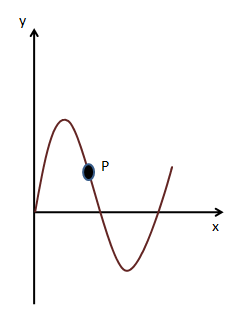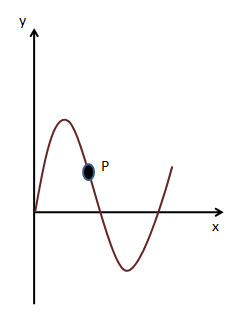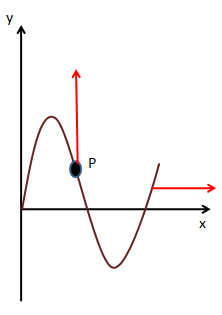Question
Question: A transverse sinusoidal wave moves along a string in the positive \(x\) - direction at a speed of \[...
A transverse sinusoidal wave moves along a string in the positive x - direction at a speed of 10cm/s . The wavelength of the wave is 0.5m and its amplitude is 10cm. At a particular time t , the snapshot of the wave is shown in figure. The velocity of point P when its displacement is 5cm is:

(A) 503πjm/s
(B) 503πjm/s
(C) 503πim/s
(D) 503πim/s
Solution
The point P is moving with a sinusoidal wave that is along a string in the positive x - direction. Use the formula of velocity of particles in a wave.
Write the angular frequency in terms of the wave velocity and wavelength.
Find the velocity of the point using the given wavelength, the wave velocity, the amplitude, and the displacement.
Formula used:
The velocity of the point P , vp=ωA2−x2
A= Amplitude and x= the displacement
The angular frequency, ω=λ2πv
v= The wave velocity and λ= wavelength.
Complete step by step answer:
The figure shown below describes the motion of sinusoidal waves along a string. We have to find the velocity and direction of the point on the string.

The sinusoidal wave is moving with a speed v along a string in the positive x - direction.
Let, the point P moves with a speed vP which can be written as,
vp=ωA2−x2
Amplitude A=10cm=0.1m
The displacement x=5cm=0.05m
The angular frequency, ω=λ2πv
Hence, vp=λ2πvA2−x2
The wave velocity v=10cm/s=0.1m/s
Wavelength λ=0.5m
∴vp=0.52π×0.1(0.1)2−(0.05)2
⇒vp=52π(0.01)−(0.0025)
⇒vp=52π0.0075
⇒vp=503π
Since the direction of the point P is towards the positive y- axis, the velocity can be written as a vector form i.e
⇒vp=503πj
The unit vector j is along the y- axis.
Hence, the correct answer is option (A).
Note: If we fix a string in two rigid supports it will stay in equilibrium position along the straight line. Now if the string is plucked and left, it vibrates towards the two sides of the equilibrium. No if we consider a point on the string, it will vibrate towards up and down directions periodically.
For the above problem the string is vibrated towards the two sides of the equilibrium position i.e. towards positive x-direction. And so the point P on it vibrates onwards the upward direction.

